Articles
- Page Path
- HOME > Korean J Community Nutr > Volume 20(5); 2015 > Article
-
Research Article
- A Study on Sodium-related Dietary Attitude and Behaviors According to Sodium-related Nutrition Knowledge of University Students
- Mi-Hyun Kim, Jee-Young Yeon, Jong Wook Kim, Jae-Eon Byun, So-Young Bu, Mi-Kyeong Choi, Yun-Jung Bae
-
Korean Journal of Community Nutrition 2015;20(5):327-337.
DOI: https://doi.org/10.5720/kjcn.2015.20.5.327
Published online: October 31, 2015
1Department of Food and Nutrition, Korea National University of Transportation, Jeungpyeong, Korea.
2Department of Food and Nutrition, Seowon University, Cheongju, Korea.
3International Cooperation Office, Director General for Planning and Coordination, Ministry of Food and Drug Safety, Cheongju, Korea.
4Imported Food Analysis Division, Gwangju Regional Food and Drug Administration, Gwangju, Korea.
5Department of Food and Nutrition, Daegu University, Daegu, Korea.
6Division of Food Science, Kongju National University, Yesan, Korea.
7Division of Food Science and Culinary Arts, Shinhan University, Uijeongbu, Korea.
- Corresponding author: Yun-Jung Bae. Shinhan University, 95, Hoam-ro, Uijeongbu, Gyeonggi 480-701, Korea. Tel: (031) 870-3572, Fax: (031) 870-3519, byj@shinhan.ac.kr
Copyright © 2015 The Korean Society of Community Nutrition
This is an Open-Access article distributed under the terms of the Creative Commons Attribution Non-Commercial License (http://creativecommons.org/licenses/by-nc/3.0/) which permits unrestricted non-commercial use, distribution, and reproduction in any medium, provided the original work is properly cited.
- 1,137 Views
- 7 Download
- 2 Crossref
Abstract
-
Objectives
- Dietary life is closely associated with dietary attitude and diet-related knowledge. Particularly, dietary habit such as sodium intake can be affected by various dietary behaviors such as food choices, dietary attitude toward salty food and a preference for salty taste. The purpose of this study was to assess sodium-related nutrition knowledge and to identify sodium-related attitude and behaviors according to the level of sodium-related knowledge of university students.
-
Methods
- Anthropometric measurements were provided by 408 students who participated in this study. The study participants answered questionnaires to provide information on general dietary behaviors, sodium-related dietary attitude and other behavioral factors. A total score of nutrition knowledge was used to categorize study participants in to two groups, namely, low level in sodium-related knowledge (LNaK) or high level in sodium-related knowledge (HNaK) and the attitude and the behaviors of students toward sodium intake were compared between these two groups.
-
Results
- The ratio of female students in HNaK group was higher than that in the LNaK group. HNaK group had a higher score in checking nutrition label of processed food than the LNaK group. Total score of sodium-related attitude and behaviors of HNaK group were 34.81 and 32.75, respectively and these scores were significantly higher than that of the LNaK group whose scores were 32.57 and 30.57, respectively. Total energy intake was not different between two groups but the intakes of calcium, vitamin B2 and folate were higher in HNaK group than in the LNaK group. Correlation analysis adjusted for age and gender revealed that total score of sodium-related nutrition knowledge was positively correlated with total score of sodium-related attitude and behaviors.
-
Conclusions
- In conclusion, students who had high level of sodium-related nutrition knowledge had desirable attitude and behaviors toward sodium intake and these results can be considered in nutrition education for university students.
- 1. Yon M, Lee YN, Kim DH, Lee JY, Koh EM, Nam EJ, et al. Major sources of sodium intake of the Korean population at prepared dish level -based on the KNHANES 2008 & 2009-. Korean J Community Nutr 2011; 16(4): 473-487.Article
- 2. Korea Centers for Disease Control and Prevention. The sixth Korea National Health and Nutrition Examination Survey (KNHANES VI-1). Cheongju: Korea Centers for Disease Control and Prevention; 2014. p. 370-557.
- 3. Park YS, Son SM, Lim WJ, Kim SB, Chung YS. Comparison of dietary behaviors related to sodium intake by gender and age. Korean J Community Nutr 2008; 13(1): 1-12.
- 4. The Korean Nutrition Society. Dietary reference intakes for Koreans. 1st revision. Seoul: The Korean Nutrition Society; 2010. p. 367-377.
- 5. Jung EJ, Shim E. Salt-related dietary behaviors and sodium intakes of university students in Gyeonggi-do. J Korean Soc Food Sci Nutr 2008; 37(5): 578-588.Article
- 6. Lee KA. Salt-related dietary behaviors of university students in Gyeongbuk area. J Korean Soc Food Sci Nutr 2014; 43(7): 1122-1131.Article
- 7. Kim MH, Kim H, Lee WK, Kim SJ, Yeon JY. Food habits and dietary behavior related to using processed food among male college students residing in dormitory and self-boarding in Gangwon. Korean J Community Nutr 2013; 18(4): 372-385.Article
- 8. Perron M, Endres J. Knowledge, attitudes, and dietary practices of female athletes. J Am Diet Assoc 1985; 85(5): 573-576.ArticlePubMed
- 9. Kim HH, Jung YY, Lee YK. A comparison of salty taste assessments and dietary attitudes and dietary behaviors associated with high-salt diets in four regions in Korea. Korean J Community Nutr 2012; 17(1): 38-48.Article
- 10. Takachi R, Ishihara J, Iwasaki M, Ishii Y, Tsugane S. Self-reported taste preference can be a proxy for daily sodium intake in middle-aged Japanese adults. J Acad Nutr Diet 2014; 114(5): 781-787.ArticlePubMed
- 11. Contento IR. Nutrition education. Sudbury: Jones and Bartlett Publishers; 2007. p. 60.
- 12. Francis SL, Taylor ML. A social marketing theory-based diet-education program for women ages 54 to 83 years improved dietary status. J Am Diet Assoc 2009; 109(12): 2052-2056.ArticlePubMed
- 13. Kim MH, Min DU, Jang EK, Yeon JY, Kim JW, Bae YJ. Salt-related dietary attitudes, behaviors, and nutrition knowledge of university students according to estimated salt intake using urinary salt signal. J Korean Soc Food Sci Nutr 2015; 44(2): 226-233.Article
- 14. Lee YK, Son SM, Lee JJ, Lee HJ, Shin EK, Park MJ. A study on a scheme to reduce sodium intake, report of management center for health promotion. Korean Health Promotion Center; 2007 07. Report No. 06-32.
- 15. Kim HH, Jung YY, Lee YK. A comparison of salty taste assessments and dietary attitudes and dietary behaviors associated with high-salt diets in four regions in Korea. Korean J Community Nutr 2012; 17(1): 38-48.Article
- 16. Sarmugam R, Worsley A, Wang W. An examination of the mediating role of salt knowledge and beliefs on the relationship between socio-demographic factors and discretionary salt use: a cross-sectional study. Int J Behav Nutr Phys Act 2013; 10(1): 25-33.Article
- 17. Kang NE, Kim J, Yoon HR. Study on differences in perception of weight management, balanced food intake, knowledge of obesity, and nutrition knowledge in male and female university students. Korean J Food Cult 2012; 27(6): 759-768.Article
- 18. Lee SL, Lee SH. Survey on health-related factors, nutrition knowledge and food habits of college students in Wonju area. Korean J Community Nutr 2015; 20(2): 96-108.Article
- 19. Lee MS, Kwak CS. The comparison in daily intake of nutrients, quality of diets and dietary habits between male and female college students in Daejeon. Korean J Community Nutr 2006; 11(1): 39-51.
- 20. Kim HK, Kim JH, Jung HK. A comparison of health related habits, nutrition knowledge, dietary habits, and blood composition according to gender and weight status of college students in Ulsan. Korean J Nutr 2012; 45(4): 336-346.Article
- 21. Pak HO, Hong MS, Sohn CY. Survey on nutrition knowledge, food behaviors, and food frequency of sodium intake in Korean university students. J East Asian Soc Diet Life 2015; 25(1): 12-19.Article
- 22. Jo SH, Kim YS. A study on the nutrition knowledge, attitude on dietary habits by meal manager of high School students in Bucheon area. Korean J Culinary Res 2010; 16(2): 330-341.
- 23. Lee SL, Lee SH. Survey on health-related factors, nutrition knowledge and food habits of college students in Wonju area. Korean J Community Nutr 2015; 20(2): 96-108.Article
- 24. Jeong KJ, Lee JH, Kim MH. A study on the nutrition knowledge, dietary behaviors, and dietary habits according to the gender in high school Students in Chungnam area. Korean J Food Nutr 2014; 27(3): 458-469.Article
- 25. Claro RM, Linders H, Ricardo CZ, Legetic B, Campbell NR. Consumer attitudes, knowledge, and behavior related to salt consumption in sentinel countries of the Americas. Rev Panam Salud Publica 2012; 32(4): 265-273.Article
- 26. Papadakis S, Pipe AL, Moroz IA, Reid RD, Blanchard CM, Cote DF, et al. Knowledge, attitudes and behaviours related to dietary sodium among 35- to 50-year-old Ontario residents. Can J Cardiol 2010; 26(5): e164-e169.Article
- 27. Cannoosamy K, Pugo-Gunsam P, Jeewon R. Consumer knowledge and attitudes toward nutritional labels. J Nutr Educ Behav 2014; 46(5): 334-340.Article
- 28. Grimes CA, Riddell LJ, Nowson CA. Consumer knowledge and attitudes to salt intake and labelled salt information. Appetite 2009; 53(2): 189-194.Article
- 29. Jang JY, Kim MJ, Han JS. A study on food frequency, dietary habits and nutrition knowledge of the elderly who intake high sodium. J Korean Soc Food Sci Nutr 2009; 38(10): 1362-1372.Article
- 30. Yon MY, Han YH, Hyun TS. Dietary habits, food frequency and dietary attitudes by gender and nutrition knowledge level in upper-grade school children. Korean J Community Nutr 2008; 13(3): 307-322.
- 31. Zhang J, Xu AQ, Ma JX, Shi XM, Guo XL, Engelgau M, et al. Dietary sodium intake: knowledge, attitudes and practices in Shandong Province, China, 2011. PLoS One 2013; 8(3): e58973.Article
REFERENCES
General characteristics of the subjects according to the level of sodium-related nutrition knowledge

Sodium-related dietary attitude of the subjects according to the level of sodium-related nutrition knowledge
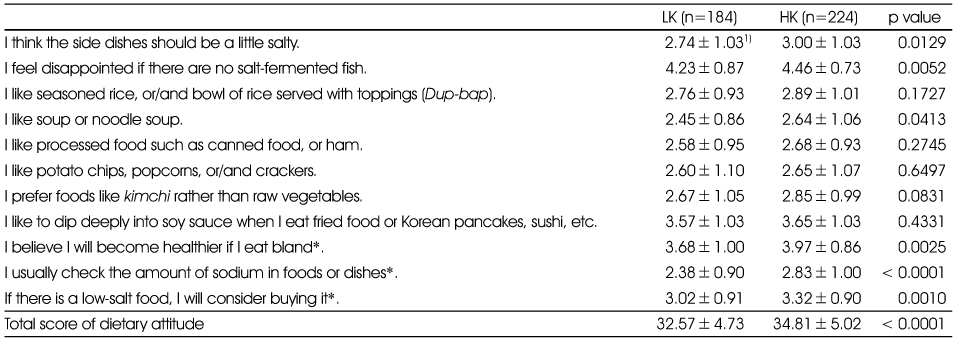
Sodium-related dietary behavior of the subjects according to the level of sodium-related nutrition knowledge
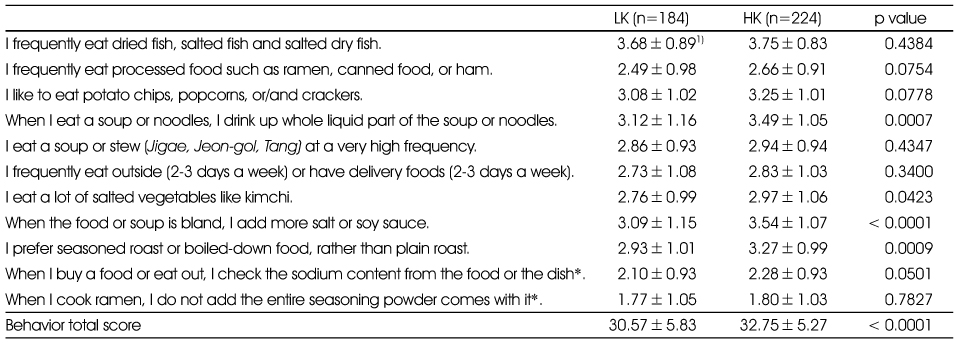
Figure & Data
REFERENCES
Citations

- Maternal nutrition intervention focused on the adjustment of salt and sugar intake can improve pregnancy outcomes
Yuri Seo, Yeon Seon Jeong, Kyung‐A Koo, Jeong In Yang, Yoo Kyoung Park
Food Science & Nutrition.2020; 8(7): 3900. CrossRef - Effect of Protection Motivation Factors on Behavioral Intention to Reduce Sodium Intake among University Students in Gyeongnam and Busan
Soo-Hyun Jang, Eunju Yoon
The Korean Journal of Food And Nutrition.2016; 29(1): 104. CrossRef
General characteristics of the subjects
1) Mean±SD
2) Body mass index
3) %
Sodium-related nutritional knowledge by the gender of the subjects
A correct answer for each question got scored 1 point, wrong or non-answer scored 0 point.
1) Mean±SD
General characteristics of the subjects according to the level of sodium-related nutrition knowledge
LK; a group of low level in sodium-related knowledge, HK; a group of high level in sodium-related knowledge
1) Mean±SD
2) Body mass index
3) %
4) Distribution of BMI within a group were compared between LK and HK by chi-square test
Dietary habits of the subjects according to the level of sodium-related nutrition knowledge
LK; a group of low level in sodium-related knowledge
HK; a group of high level in sodium-related knowledge
1) Mean±SD
2) %
Sodium-related dietary attitude of the subjects according to the level of sodium-related nutrition knowledge
LK; a group of low level in sodium-related knowledge, HK; a group of high level in sodium-related knowledge
Scoring scale: 5(very disagree)~1(very agree) * Reverse recording: 1(very disagree)~5(very agree)
1) Mean±SD
Sodium-related dietary behavior of the subjects according to the level of sodium-related nutrition knowledge
LK; a group of low level in sodium-related knowledge, HK; a group of high level in sodium-related knowledge
Score scale 5 (very disagree)~1(very agree) * Reverse recording: 1 (very disagree)~5 (very agree)
1) Mean±SD
Mean daily energy and nutrient intakes of the subjects according to the level of sodium-related nutrition knowledge
LK; a group of low level in sodium-related knowledge, HK; a group of high level in sodium-related knowledge
1) Mean±SD
Correlation coefficient of sodium-related nutritional knowledge score with the blood pressure, sodium-related attitude, and behavior score in the subjects
**: P < 0.01, ***: P < 0.001
1) Mean±SD 2) Body mass index 3) %
A correct answer for each question got scored 1 point, wrong or non-answer scored 0 point. 1) Mean±SD
LK; a group of low level in sodium-related knowledge, HK; a group of high level in sodium-related knowledge 1) Mean±SD 2) Body mass index 3) % 4) Distribution of BMI within a group were compared between LK and HK by chi-square test
LK; a group of low level in sodium-related knowledge HK; a group of high level in sodium-related knowledge 1) Mean±SD 2) %
LK; a group of low level in sodium-related knowledge, HK; a group of high level in sodium-related knowledge Scoring scale: 5(very disagree)~1(very agree) * Reverse recording: 1(very disagree)~5(very agree) 1) Mean±SD
LK; a group of low level in sodium-related knowledge, HK; a group of high level in sodium-related knowledge Score scale 5 (very disagree)~1(very agree) * Reverse recording: 1 (very disagree)~5 (very agree) 1) Mean±SD
LK; a group of low level in sodium-related knowledge, HK; a group of high level in sodium-related knowledge 1) Mean±SD
**:

 KSCN
KSCN

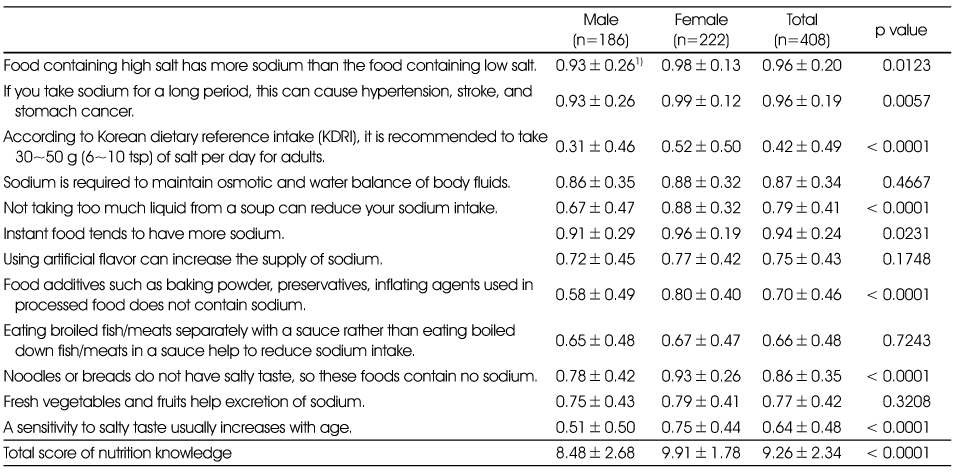
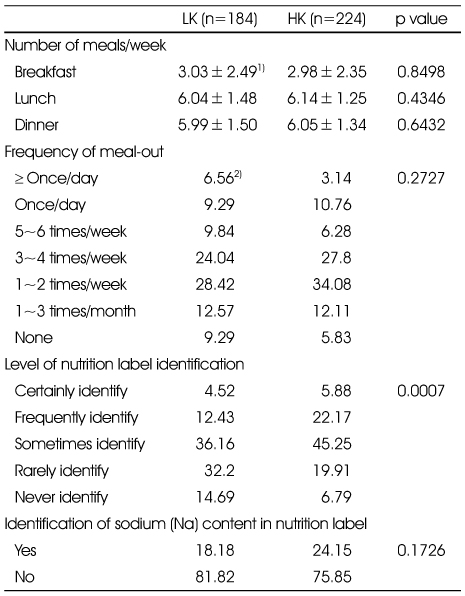
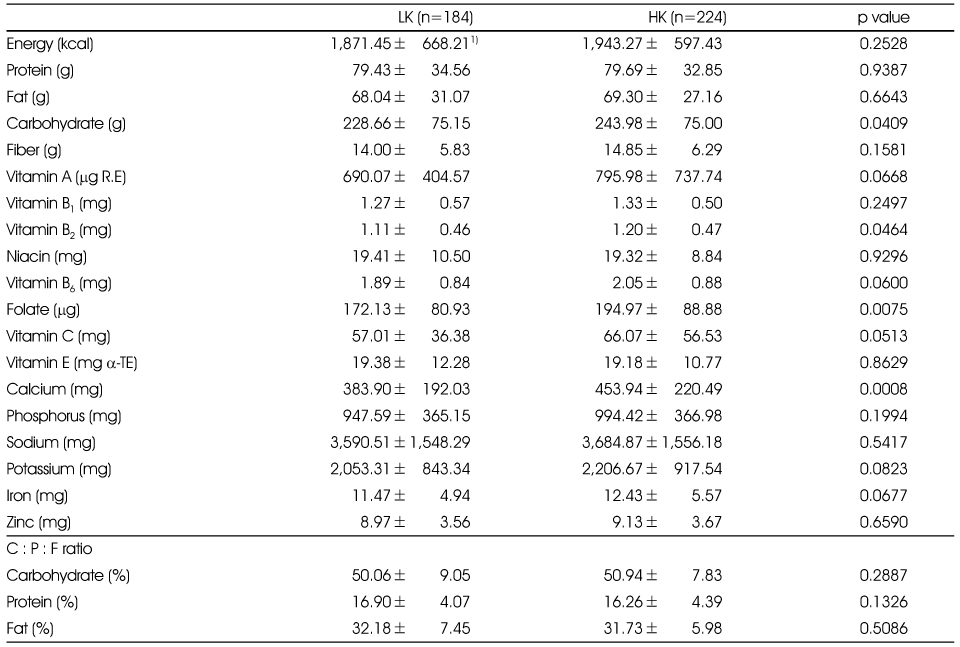
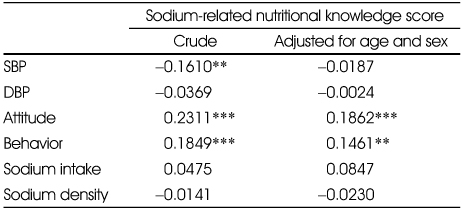
 Cite
Cite


